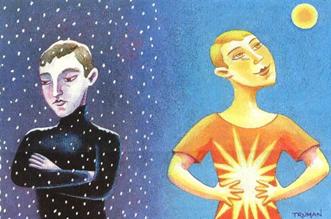Seasonal Affective Disorder is common in the Northwest, especially during the gloomy winter months. With days being short, cloudy and wet, the "winter blues" make people lethargic, sad and possibly depressed. Those with a serious clinical diagnosis may experience hypomania, a form of anxiety, in the summer months. However, many people claim they have "Seasonal Affective Disorder", but truly only those with a severe clinical case have S.A.D.
Humans understand that animals hibernate and some mammals gain large amounts of weight to suffice them through the winter sleeping until spring arrives. However, humans who live the grind between work, family and responsibility do not have the luxury of taking four to six months off work to sleep the winter away. However, dealing or dwelling with gloomy weather is a mindset.
Yes, there are going to be days where individuals experience fatigue due to poor weather, but to live seasonally through sadness is easily overridden through a mental shift.
These tips below help individuals seek a better winter-outlook.
1. Identify what changes in your mental and emotional state during the winter months.
2. Identify what behaviors are altered during the winter months
3. Once you have this information identified, recognize if there are any excuses to not fulfilling these tasks due to the weather.
Unfortunately, the weather will not change during the winter months. Therefore, this is an area that needs to be recognized as "it is what it is". Easier said than done, people need to continue their lives, especially their fitness. Weather is unpredictable. Some days are sunny, some are cloudy, some are stormy. Life events happen daily, and recognizing weather barriers into your life routine can assist in having a better outlook during the winter months. Why? Because you have made a conscious effort to notice what you track you fall off during the winter months. Something as simple as making a conscious effort aids in knowing that it is our decision, not the weather, to do or not to do something. Just understand that animals and humans are all affected by weather. However, we need to learn to deal with weather, and utilizing medications such as anti-depressants don't necessarily give us the motivation to do something. Internal thought processes and battles tell us yes or no to task completion.
At the end of the day, think about the positive aspects of Pacific Northwest winters (mild climate, lack of heavy snow in urban areas, lots of snow for play in the mountains). At least we don't have to deal with the 24 hours of darkness like our nearby neighbor, Alaska.
Add The Sports Daily to your Google News Feed!
